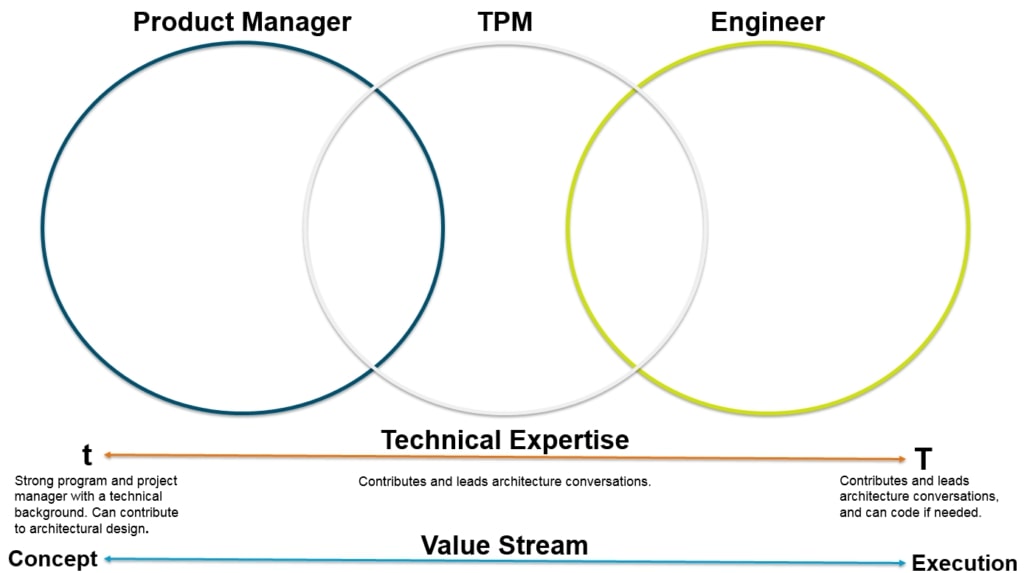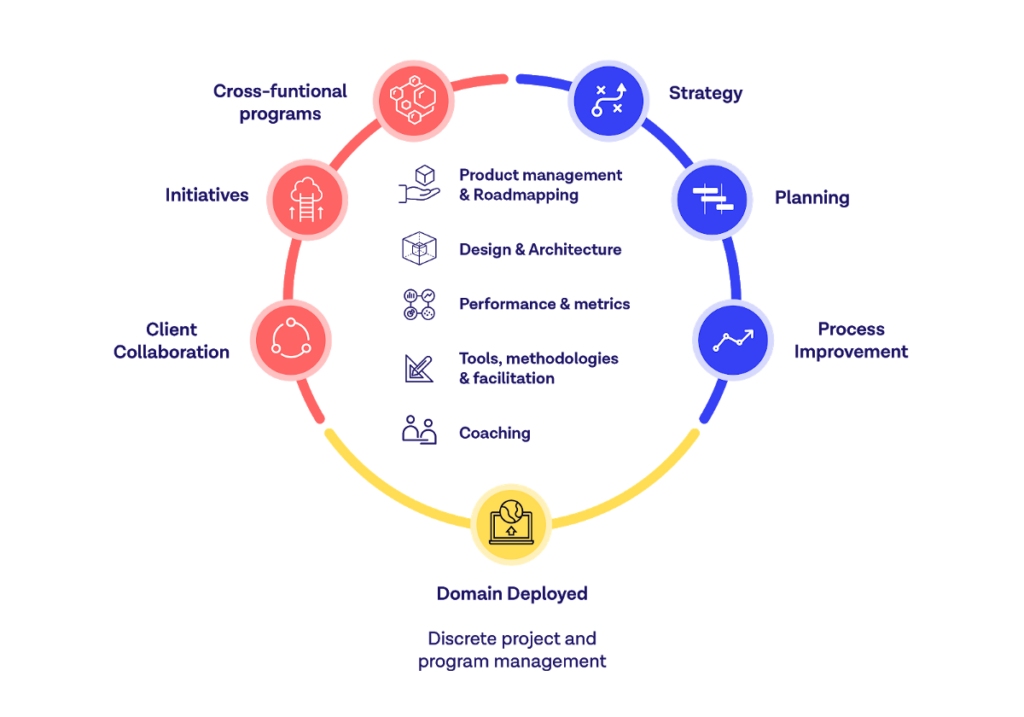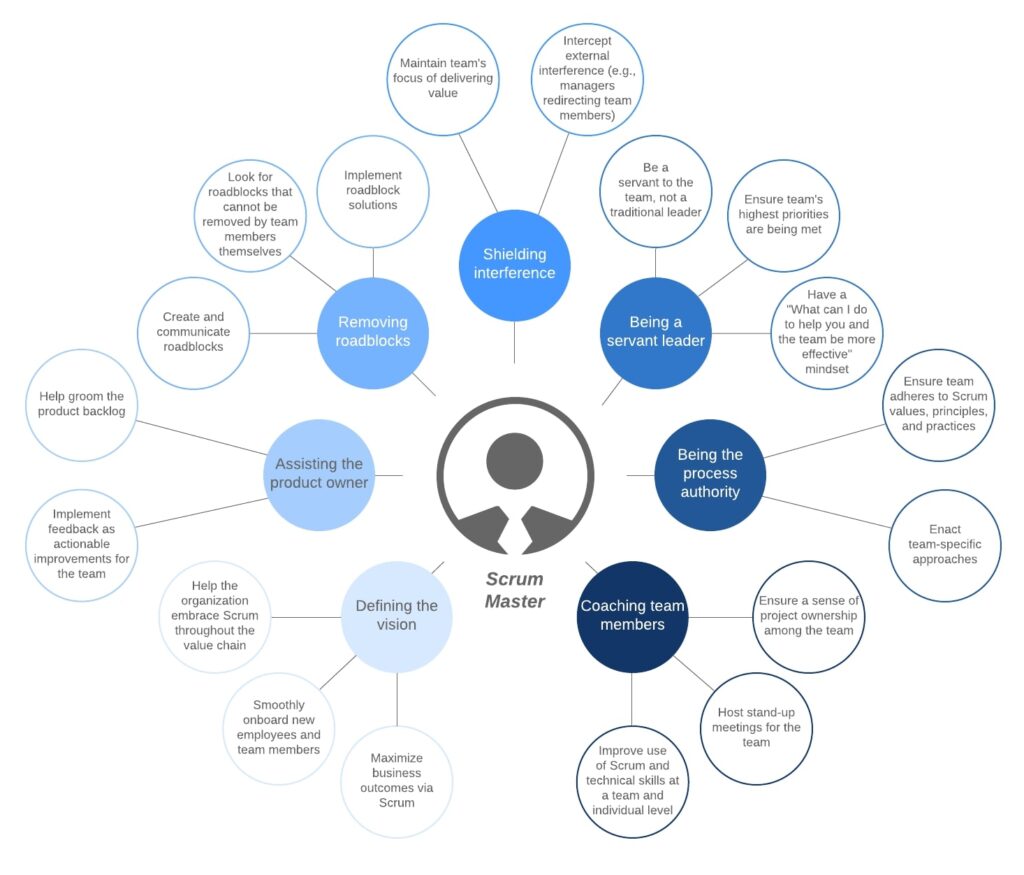Wondering what’s the truth about the technical program manager vs scrum manager debate?
In IT design, development, and product creation, technical program managers and scrum managers both play important roles from start to finish.
However, aspiring product professionals misunderstand the subtleties between technical program managers and scrum managers.
In this post, we break down the core differences between both roles to help product professionals plan successful careers in such a lucrative niche.
To learn more via video, watch below. Otherwise, skip ahead.
Technical Program Manager Role
Technical program managers are problem-solving professionals who prioritize proper project execution. They have many responsibilities, all of which emphasize broader business goals instead of individual product completion.

Credits: Medium
Let’s say a company begins a broad tech program to launch a new social media platform. Once finished, the platform enables community building, and broader brand awareness, among other benefits.
The technical program manager handles collaboration between different teams as they create various products for the social media platform launch.
In doing so, the technical program manager understands the scope and technical specifications of all created products. They also know how the different pieces for the upcoming program fit together.
They oversee the entire program from start to finish. That includes product marketing, product design, and compatibility as well as how the budget shifts as deadlines get closer.
As the launch date gets closer, the technical program manager ensures that their team meets all deadlines, that product features work, and that other departments fulfill their roles relative to product launches.
Technical Program Manager Responsibilities
In many ways, technical program managers oversee multiple projects or product development in cycles in an organization. They do not focus on a specific product’s design, development, or specifications.

Credits: Medium
Instead, a technical program manager works more on the business side of things. Their responsibilities include:
- Working with developers so they know what products to create and how they impact the company as a whole
- Engineering proper planning, design, and execution of new product creation and launches
- Working with companies and large project teams that include other project managers
- Driving new programs while accounting for risk management or threats to company progress
- Following program progress and ensuring project scope doesn’t get out of hand with the product owner
- Offering support to product managers and other key personnel
- Establishing the guidelines or constraints that product managers must abide by
- Communicating between departments, such as product design and development departments, marketing departments, and HR departments
- Bringing necessary team members onto specific projects while accounting for development team dynamics
- Communicating with external stakeholders, supervisors, project management staff, and company executives as necessary
Scrum Manager Role
Scrum managers are professionals who teach team members about the Scrum framework under agile methodology.
The scrum framework uses sprint cycles to promote consistent product development lifecycles and execute project tasks.
Product leaders utilize the scrum framework in software development and other IT product creation atmospheres due to its agility. This framework enables teams to take feedback into account, tackle backlog tasks, and accomplish objectives on time.
Not all team members know how to practice the Scrum framework by default. Scrum managers, also called scrum masters, teach these skills and highlight the benefits of this methodology.
Scrum Manager Responsibilities
The main responsibilities of the scrum master role include:
- Ensuring that all scrum team members follow the scrum framework after teaching it
- Facilitating Scrum events, such as sprint planning or sprint retrospective to help team members understand how they’ve progressed so far
- Coaching conversations with product owners, product managers, and other professionals
- Providing feedback to team members so they streamline their scrum framework practices

Credits: Lucid Chart
An agile project manager does not focus on what a team makes or the overall goals for that product. Instead, scrum managers focus on how the team makes products. They ensure that teams create products using the right methodology to prevent mistakes or time sinks.
Important Technical Program Manager Skills
Technical program managers need different skills to succeed in their positions. For example, they need enough technical skills to understand the products they oversee. They must see how different products impact overall company performance and features.
Beyond this, technical program managers need skills including:
- Communication skills: They communicate with product managers, between departments, and to executives or stakeholders as needed. They facilitate collaborations between departments, so they must communicate and foster teamwork between different areas of a company
- Leadership skills: While not product owners, technical program managers are responsible for the success or failure of their projects. They take responsibility for product failures and successes alike
- Organizational skills: Technical program managers must know how to organize resources to maximize productivity and impact
- Tme management skills: Technical program managers determine how many personnel work on a given project
Technical program managers require business-focused skills more than anything else. However, technical program managers also require some tech-related skills compared to standard program managers. They are more tech-inclined than standard program managers.
Important Scrum Manager Skills
Scrum managers leverage several important skills to accomplish their tasks, including:
- Communication skills: Scrum managers coach and inspire team members to use the scrum framework even if they are unfamiliar with it.
- Teaching skills. Scrum masters know how to break down the abstract concepts of the scrum framework into understandable ideas
- Organization skills. The scrum framework works with excellent time management organization. Scrum managers lead by example and show how the staged setup of a scrum cycle works for a current project
Scrum managers do not need as many technical or focused skills as tech program managers. Recruiters hire scrum managers from outside an organization for the sole purpose of teaching the Scrum framework.
Technical Program Manager Salary
Technical program managers earn $126,000 a year on average. However, some technical program managers earn upwards of $466,000 a year. Others earn around $40,000 a year. Salary is contingent on factors such as seniority, number of projects overseen, and tech experience.
Scrum Manager Salary
Scrum managers pull in $139,500 per year on average. The lowest-paid scrum masters earn $124,000 a year and the highest-paid earn around $156,000 a year.
Technical Program Manager Career Path
Technical program managers advance within the program management field. Potential job advancements include:
- Senior technical program managers. These professionals oversee other tech program managers and broader projects or company directives. They also have additional responsibilities and higher salaries.
- Staff technical program managers. These individuals oversee staffing requirements and personnel allocation more than other elements of program management.
- Senior or group technical program managers. Also called rentable technical program managers, these professionals head program management departments. They handle many of the same responsibilities described above. That said, they have more direct leadership roles and communicate with company executives
- Directors of technical program management. These individuals also head program management departments.
- Chief information officer or CIO. These individuals direct company strategy and broad objectives while taking technical product development into account.
Scrum Manager Career Path
Many scrum managers further develop their agile framework skills and knowledge. They proceed further down the scrum master career path and acquire jobs including but not limited to:
- Scrum mentors. Scrum mentors, also called agile coaches, teach other scrum managers how to facilitate good scrum practices and methodological consistency. These professionals prefer working within the Scrum framework more than any other part of the product development process.
- Product owners. Some scrum managers enjoy learning about the specifics of what they create rather than how they create it. Thus, they switch career paths and focus more on the product creation design, conception, and stages instead of the scrum methodology
Scrum managers always have the option to pivot into program or product management, as well. Some scrum masters find product management to be an enjoyable career path. Product managers work alongside scrum managers in many circumstances. But they focus more on what they make rather than how they do it.
Technical Program Manager vs Scrum Manager: Key Takeaways
Technical program managers are broad-focused, lateral leaders who oversee broad projects that encompass several products in development at once. They ensure that product managers meet deadlines on time, allocate resources as needed, and communicate progress to company executives or stakeholders
Scrum managers ensure that team members follow the scrum agile methodology on a single product or project. They do not focus on the product created or even the product outcome. Both individuals are important in modern tech development enterprises.
